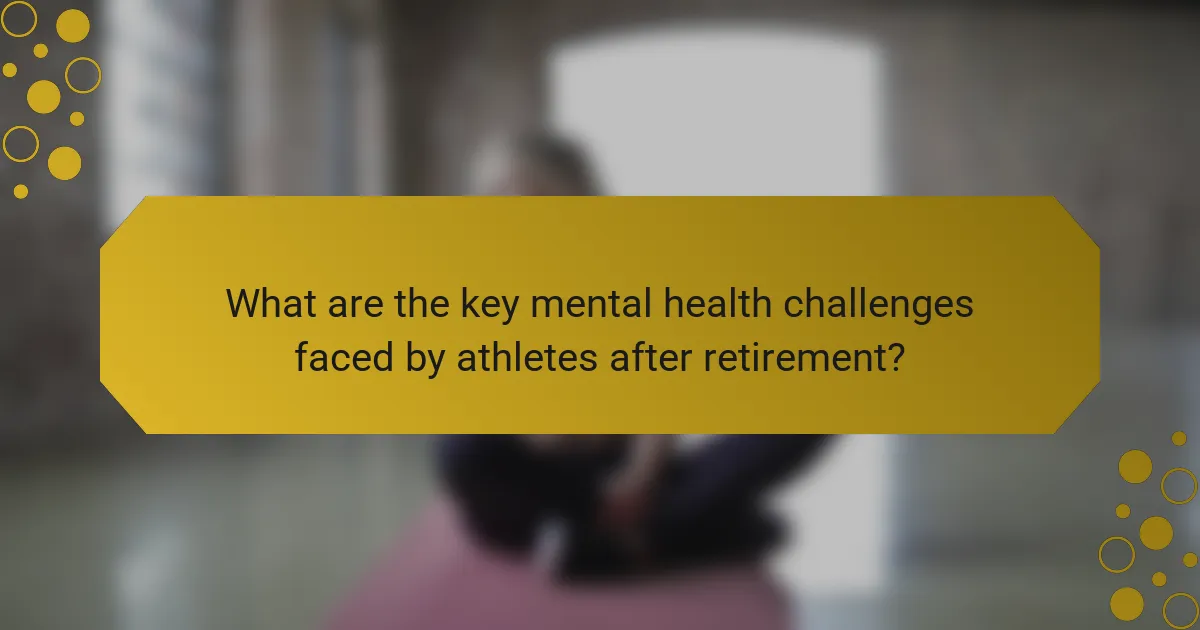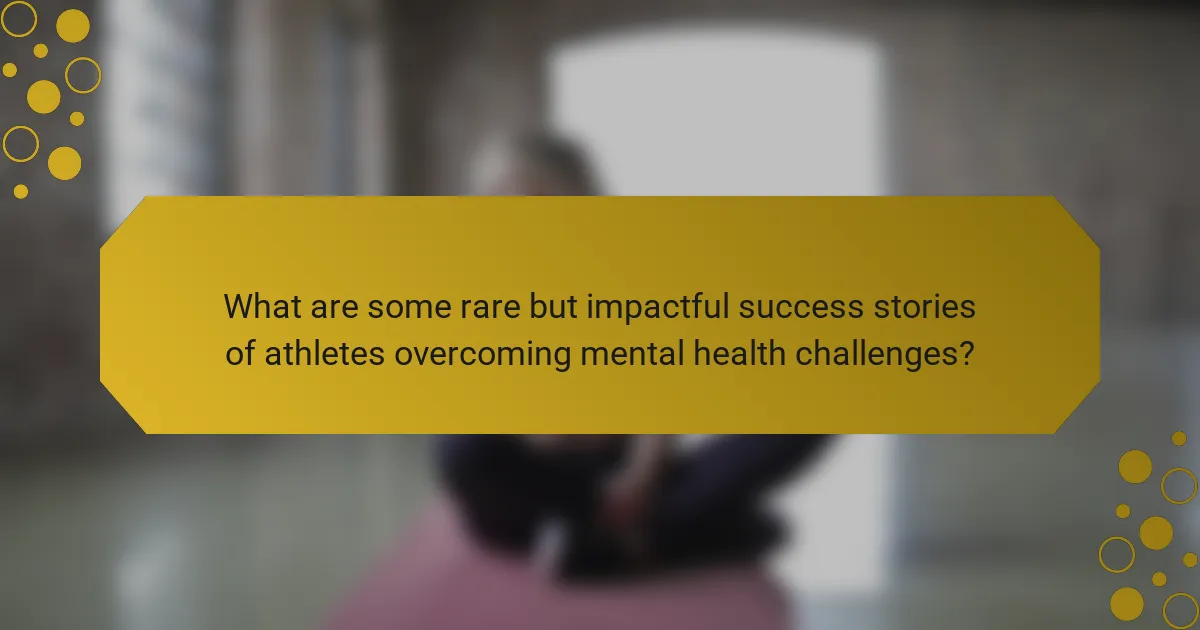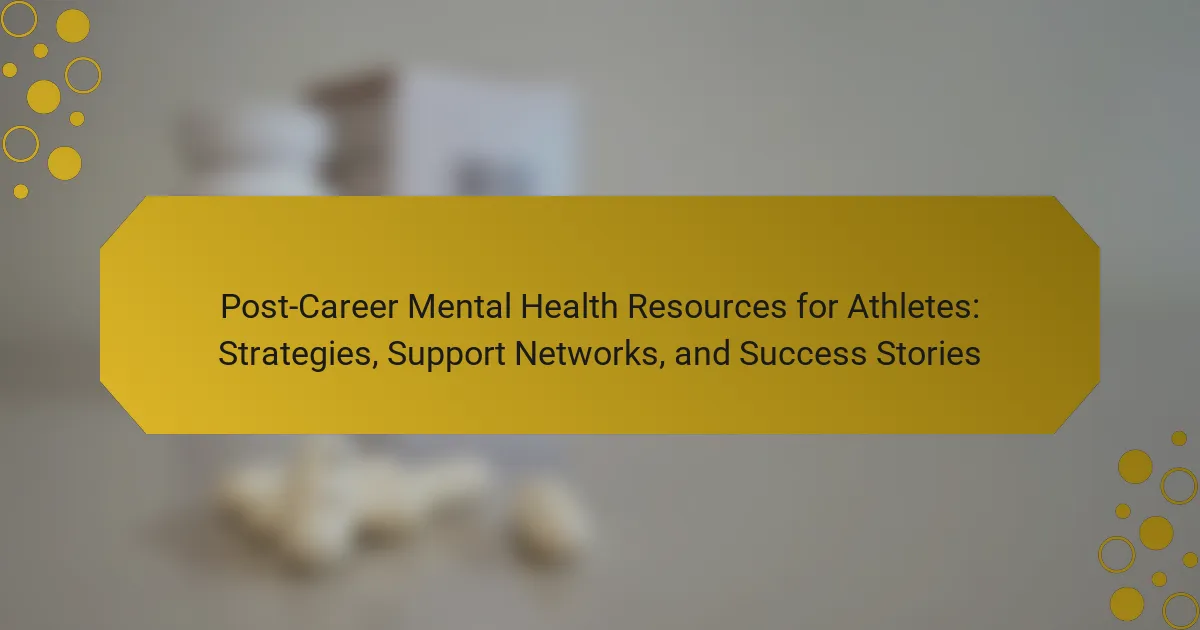Retired athletes often struggle with mental health challenges such as depression and anxiety due to significant lifestyle changes. This article explores essential mental health resources, including counselling services and peer support groups. It also highlights effective strategies for maintaining mental well-being and shares inspiring success stories from athletes like Michael Phelps and Simone Biles. Understanding these aspects can aid in a healthier transition and promote long-term mental wellness.

What are the key mental health challenges faced by athletes after retirement?
Athletes often face significant mental health challenges after retirement, including depression, anxiety, and identity loss. These issues stem from the abrupt lifestyle changes, loss of social support, and pressure to perform. Support networks, such as mental health professionals and peer groups, play a crucial role in addressing these challenges. Strategies such as mindfulness, therapy, and community engagement can aid in recovery and adaptation. Success stories of athletes who have navigated these challenges highlight the importance of seeking help and building new identities post-career.
How does identity loss impact retired athletes’ mental well-being?
Identity loss significantly affects retired athletes’ mental well-being, often leading to anxiety and depression. The transition from a defined sports identity to civilian life can create feelings of emptiness. Mental health resources, such as counselling and peer support groups, are vital for navigating this change. Success stories highlight the importance of community and resilience in overcoming these challenges.
What role does social isolation play in post-career mental health?
Social isolation significantly impacts post-career mental health for athletes, often leading to depression and anxiety. Many athletes struggle with identity loss after retirement, exacerbating feelings of loneliness. Support networks, such as peer groups and mental health professionals, can mitigate these effects. Engaging in community activities and maintaining social connections are crucial strategies for improving mental well-being post-career.
What are the signs of social isolation in retired athletes?
Signs of social isolation in retired athletes include withdrawal from social activities, decreased communication with friends and family, and feelings of loneliness. They may also exhibit changes in mood, such as increased anxiety or depression, and a lack of interest in hobbies. Recognising these signs is crucial for accessing mental health resources and support networks tailored for athletes transitioning from their careers.
How can the transition to civilian life affect mental health?
The transition to civilian life can significantly impact mental health due to identity shifts and loss of structured support. Athletes often face challenges in adapting to new roles, leading to anxiety and depression. Accessing post-career mental health resources is crucial for managing these changes. Support networks, such as peer groups and counselling services, provide essential guidance and encouragement. Success stories from former athletes illustrate the positive outcomes of seeking help, emphasising resilience and adaptation in civilian life.

What are the universal mental health resources available for retired athletes?
Retired athletes have access to various mental health resources aimed at supporting their transition. These include counselling services, peer support groups, and online platforms dedicated to mental well-being.
Counselling services offer personalised assistance, helping athletes navigate identity shifts post-retirement. Peer support groups create community connections, allowing athletes to share experiences and coping strategies. Online platforms like forums and apps provide accessible resources and information on mental health topics relevant to retired athletes.
Success stories from retired athletes who have effectively utilised these resources can inspire others. They demonstrate the importance of seeking help and highlight the positive outcomes of engaging with mental health support systems.
What types of counselling services are accessible to former athletes?
Former athletes can access various counselling services, including individual therapy, group therapy, and specialised programmes. Individual therapy offers personalised support, while group therapy fosters community and shared experiences. Specialised programmes often address specific challenges like identity loss or mental health issues. Many organisations provide these resources, ensuring athletes receive the necessary guidance during their transition.
How can peer support groups benefit retired athletes?
Peer support groups significantly benefit retired athletes by providing emotional support, fostering community, and promoting mental well-being. These groups create a safe space for sharing experiences and challenges unique to post-career transitions. Participants often report reduced feelings of isolation and increased resilience. Engaging with peers who understand similar struggles enhances coping strategies and encourages personal growth. Through shared stories, athletes can learn effective mental health strategies, contributing to overall life satisfaction and successful adjustment to retirement.
What are some successful peer support group models?
Successful peer support group models for athletes focus on community, shared experiences, and mental health education. Examples include the Athlete Assistance Programme, which offers structured support and resources, and the Mental Health Champions initiative, empowering former athletes to lead discussions. These models emphasise connection, reducing stigma, and fostering resilience among participants. Programmes often incorporate workshops, one-on-one mentoring, and online forums to enhance accessibility and engagement.
What online platforms offer mental health resources tailored for athletes?
Several online platforms provide tailored mental health resources for athletes. These include Headspace, which offers mindfulness and meditation specifically for sports performance, and BetterHelp, connecting athletes with licensed therapists experienced in sports-related mental health issues. Additionally, the Athlete Assistance Programme provides resources and support networks dedicated to the unique challenges athletes face post-career. Mental Health America also features resources focusing on the mental health needs of athletes, including articles and community support.

What unique strategies can athletes adopt for mental health maintenance post-career?
Athletes can adopt several unique strategies for mental health maintenance post-career. Engaging in peer support groups fosters connection and shared experiences. Establishing a routine that includes physical activity promotes mental well-being. Pursuing new interests or hobbies can provide a sense of purpose. Seeking professional mental health support ensures access to tailored resources. Volunteering in community programmes helps maintain social ties and enhances self-esteem. These strategies contribute to a healthier transition and long-term mental wellness.
How can athletes leverage their competitive mindset for personal growth?
Athletes can leverage their competitive mindset for personal growth by embracing challenges, setting goals, and fostering resilience. This mindset encourages continuous improvement and adaptability, essential for navigating post-career transitions. Engaging with support networks enhances emotional well-being, while success stories from peers provide motivation. Utilising mental health resources can further strengthen their personal development journey.
What role does physical activity play in mental health after retirement?
Physical activity significantly enhances mental health after retirement by promoting emotional well-being and reducing anxiety. Engaging in regular exercise helps retired athletes maintain social connections, which are crucial for mental resilience. Studies indicate that physical activity can decrease feelings of depression by up to 30%, illustrating its unique attribute as a natural mood enhancer. Additionally, structured exercise routines provide a sense of purpose and accomplishment, aiding the transition from competitive sports to everyday life. As a result, integrating physical activity into post-career routines is vital for sustaining mental health and overall quality of life.
What types of physical activities are most beneficial for mental health?
Engaging in physical activities like aerobic exercises, strength training, and yoga significantly benefits mental health. These activities reduce anxiety, depression, and stress while enhancing mood and cognitive function. Aerobic exercises, such as running or cycling, improve cardiovascular health and release endorphins. Strength training builds resilience and promotes self-esteem. Yoga fosters mindfulness, reducing negative thoughts. Athletes transitioning from their careers can utilise these activities as effective mental health resources, facilitating emotional well-being and community connections.
How can athletes cultivate new hobbies for mental well-being?
Athletes can cultivate new hobbies for mental well-being by exploring activities that promote relaxation and creativity. Engaging in pursuits like painting, gardening, or music can provide a therapeutic outlet. Additionally, joining local clubs or online communities fosters social connections, enhancing emotional support. Practising mindfulness through yoga or meditation can also be beneficial, helping athletes transition to a balanced post-career life.

What are some rare but impactful success stories of athletes overcoming mental health challenges?
Several athletes have shared rare but impactful success stories of overcoming mental health challenges. Michael Phelps, a decorated swimmer, has openly discussed his struggles with anxiety and depression, advocating for mental health awareness. Similarly, Olympic gymnast Simone Biles prioritised her mental well-being during competitions, highlighting the importance of self-care. Kevin Love, an NBA player, has also shared his journey with anxiety, promoting discussions around mental health in sports. These stories illustrate resilience and the effectiveness of support networks in post-career transitions.
Who are notable athletes that have publicly shared their mental health journeys?
Notable athletes who have publicly shared their mental health journeys include Michael Phelps, Simone Biles, and Kevin Love. Michael Phelps, a decorated swimmer, has discussed his struggles with depression and anxiety, advocating for mental health awareness. Simone Biles, a gymnastics champion, prioritised her mental health during the Tokyo Olympics, emphasising the importance of mental well-being in sports. Kevin Love, an NBA player, has openly shared his experiences with anxiety and panic attacks, encouraging others to seek help. These athletes highlight the significance of mental health support in sports.
What lessons can be learned from these success stories?
Success stories of athletes utilising post-career mental health resources reveal valuable lessons. They highlight the importance of seeking support, embracing vulnerability, and maintaining a structured routine. These narratives demonstrate that proactive mental health strategies can lead to successful transitions. Additionally, building strong support networks fosters resilience and promotes overall well-being. Athletes who share their experiences inspire others to prioritise mental health, showcasing that recovery and growth are achievable.

What best practices can athletes follow for effective post-career mental health planning?
Athletes can enhance their post-career mental health by following several best practices. Establishing a strong support network is crucial, including connecting with former teammates, coaches, and mental health professionals. Engaging in regular physical activity helps maintain mental well-being and a sense of routine. Setting new personal goals fosters a sense of purpose and direction. Additionally, seeking professional counselling can provide tailored strategies for managing the transition. Finally, sharing success stories and experiences can inspire others and create a community of support.
How can athletes create a personal mental health action plan?
Athletes can create a personal mental health action plan by identifying their unique needs and resources. First, assess personal mental health goals, such as stress management or emotional resilience. Next, outline specific strategies, including mindfulness practices, therapy options, and support networks. Establish a routine for regular mental health check-ins, and seek feedback from trusted peers or professionals. Finally, adapt the plan as needed based on progress and changing circumstances.
What common mistakes should retired athletes avoid in their mental health journey?
Retired athletes should avoid neglecting mental health, isolating themselves, and failing to seek professional help. Acknowledging emotions and engaging in open conversations are crucial. Many athletes struggle with identity loss post-career, leading to depression. Building a support network and utilising mental health resources can facilitate a smoother transition. Prioritising self-care and staying active in communities related to sports can foster resilience.
What expert insights can guide athletes in their post-career mental health journey?
Athletes can enhance their post-career mental health by utilising tailored resources and support networks. Engaging with mental health professionals specialising in sports psychology offers crucial guidance. Peer support groups provide shared experiences, fostering connection and understanding. Success stories from former athletes highlight effective coping strategies and inspire resilience. Regular physical activity and mindfulness practices contribute to emotional well-being, promoting a balanced transition.
